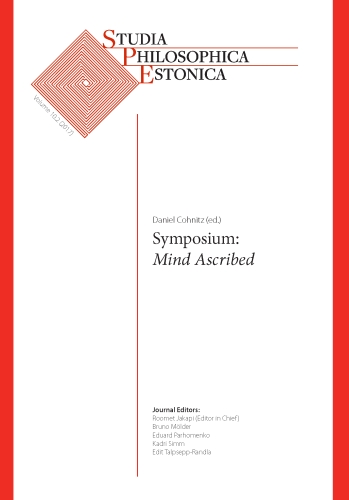Ascribing Minds and Knowing What You Think
DOI:
https://doi.org/10.12697/spe.2017.10.2.06Keywords:
ascriptivism, Dennett, introspection, folk psychology, eliminativismAbstract
In Mind Ascribed Bruno Mölder works out a powerful and subtle view according to which the ascription in mental states in folk psychology constitutes mental phenomena. I discuss two issues raised by his account. The first is the relation of the mind, so understood, to other phenomena, and in particular the sciences of the mind. If the mind is constituted by folk psychological ascription, can that ascription be constrained by the results of empirical investigation, or is folk psychology autonomous, if not a priori? Second, I suggest that the transparency view of introspection works very well as a supplement to the ascriptivist position.
References
Bennett, M. and Hacker, P. (2003). Philosophical Foundations of Neuroscience, Blackwell Publishing, Oxford.
Churchland, P. M. (1981). Eliminative materialism and the propositional attitudes, The Journal of Philosophy 78: 67-90.
Dennett, D. (1981). Brainstorms, MIT Press, Cambridge, MA.
Evans, G. (1982). The Varieties of Reference, Clarendon Press, Oxford.
Gordon, R. (2007). Ascent routines for propositional attitudes, Synthese 159: 151-165.
Lyons, W. (1983). The Disappearance of Introspection, MIT Press, Cambridge, MA.
Mölder, B. (2010). Mind Ascribed: An Elaboration and Defence of Interpretivism, John Benjamins, Amsterdam.
Peacocke, C. (1999). Being Known, Oxford University Press, Oxford.
Ryle, G. (1949). The Concept of Mind, Blackwell, Oxford.
Stich, S. (1983). From Folk Psychology to Cognitive Science, MIT Press, Cambridge, MA.





